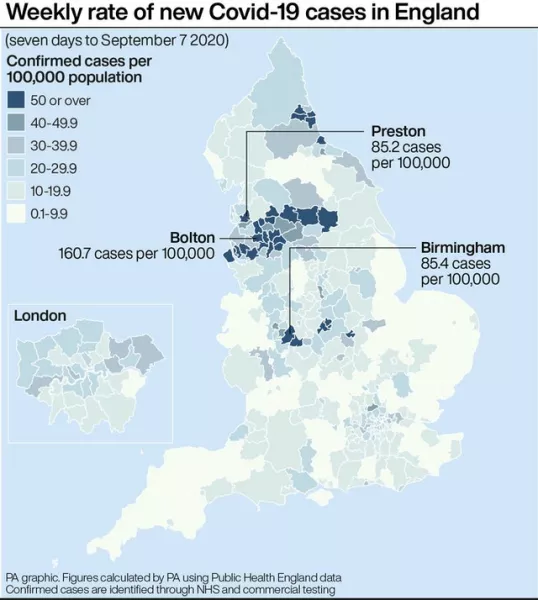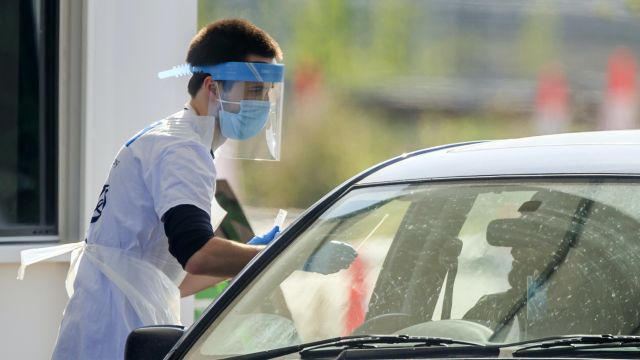A total of 3,539 new Covid-19 cases were recorded on Friday, the UK's Department of Health said.
It is the highest daily figure since May 17th and Public Health England’s medical director Professor Yvonne Doyle warned that it is a reminder of the “ongoing risk as the virus spreads throughout the UK”.

The figure rose sharply from 2,919 the previous day and most cases are people who have been tested in the community.
Prof Doyle warned that there are now “worrying signs” of infections among the elderly.
She said: “Although younger people continue to make up the greatest share of new cases, we’re now starting to see worrying signs of infections occurring in the elderly, who are at far higher risk of getting seriously ill.
“This is a reminder of the ongoing risk as the virus spreads throughout the UK. People should continue to follow social distancing rules, wash their hands regularly and wear a face covering in enclosed spaces. You should not mix with others when unwell.”
It came as stricter measures are being imposed on Birmingham in the latest local lockdown announcement, after a spike in cases there.
The city and neighbouring Solihull and Sandwell boroughs all face a ban from next week on socialising between people outside their own household.
Also on Friday, the Uk government revealed a launch date for the delayed NHS app which it hopes will help to contain the virus during what the Health Secretary described as a “critical time”.
The tracing app is due to be rolled out across England and Wales on September 24, and pub goers and diners will be among those urged to download it and check themselves in to venues.
Matt Hancock said it is “vital” the NHS Test and Trace system is used to reach as many people as possible to prevent outbreaks and “stop this virus in its tracks”.
Data released by the government Office for Science and the Scientific Advisory Group for Emergencies (Sage) shows the estimate for the R value – the reproduction number of coronavirus transmission – across the UK is between 1.0 and 1.2.
According to government advisers, the last time R was above 1 was in early March.
Elsewhere, Office for National Statistics (ONS) estimates suggested there has been a 60 per cent rise in daily infections in England.
The ONS said the rate of new infections in private households was estimated to be at an average of 3,200 people per day between August 30th and September 5th, up from 2,000 the previous week.
Katherine Kent, co-head of analysis for the Covid-19 Infection Survey, said its latest results suggest a rise in Covid-19 infections in England during recent weeks, with higher infection rates among 17 to 34-year-olds.
She said: “These findings highlight how important it is that we continue to monitor Covid-19 infections in the country.”
What we are seeing is evidence of an epidemic in the community and not a result of increased testing capacity
Separately, new data from an Imperial College London study suggested coronavirus cases in England were doubling every seven to eight days at the beginning of September.
The findings of the latest round of the Real-Time Assessment of Community Transmission (REACT-1) study suggest the virus is now spread more widely in the community, those behind the research said.
Professor Paul Elliott, director of the programme at Imperial from the School of Public Health, said the “large and robust dataset clearly shows a concerning trend in coronavirus infections, where cases are growing quickly across England and are no longer concentrated in key workers”.
He added: “What we are seeing is evidence of an epidemic in the community and not a result of increased testing capacity.
“This is a critical time and it’s vital that the public, our health system and policymakers are aware of the situation as we cannot afford complacency.”
A further six people had died within 28 days of testing positive for Covid-19 as of Friday, according to the Government dashboard, bringing the UK total to 41,614.
Separate figures published by the UK’s statistics agencies show there have now been 57,400 deaths registered in the UK where Covid-19 was mentioned on the death certificate.







